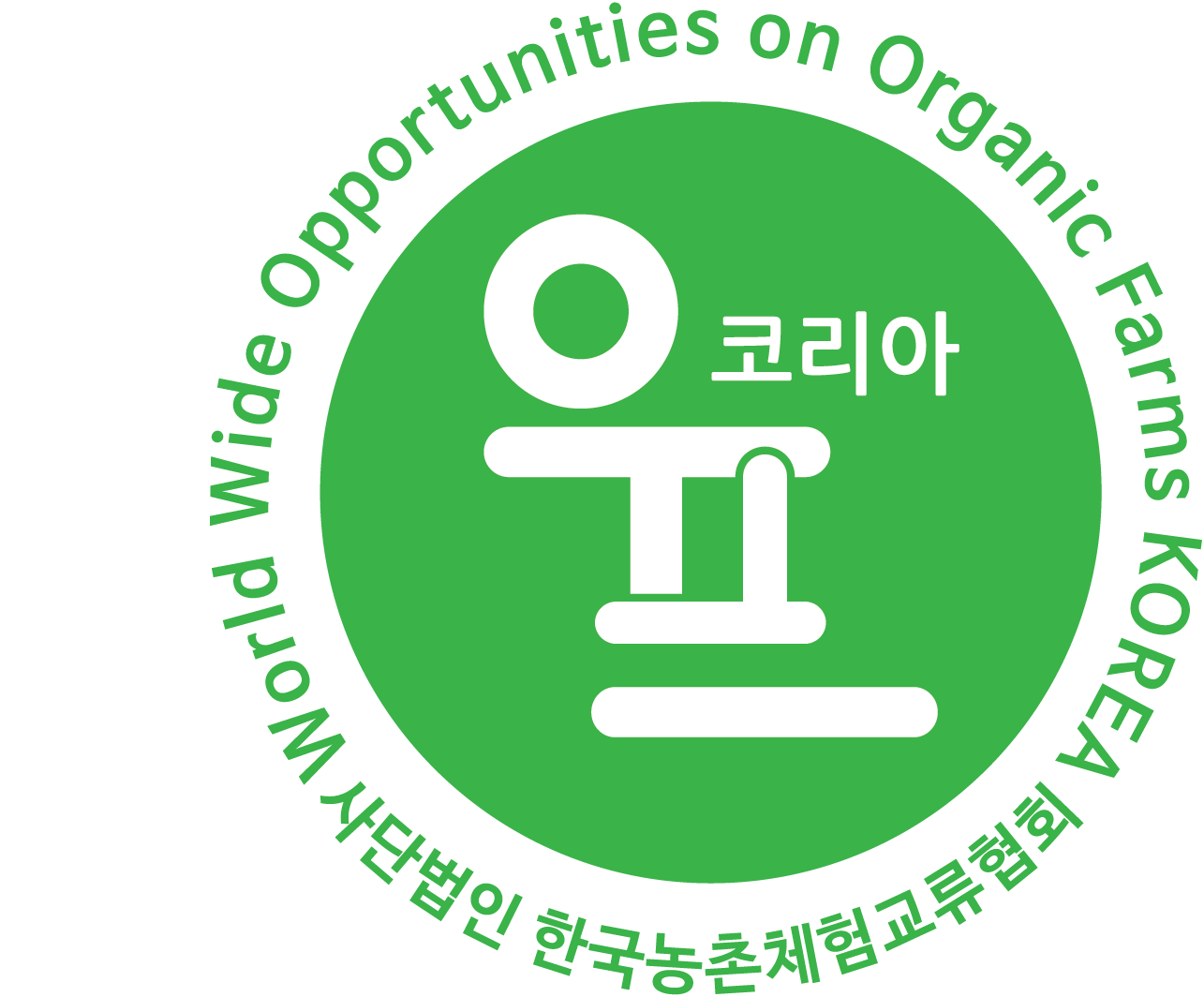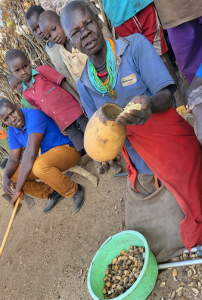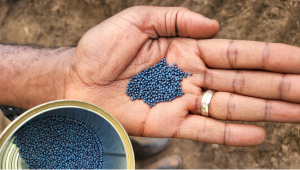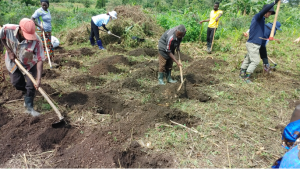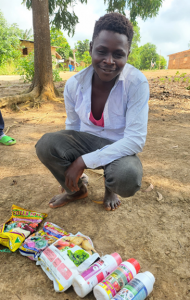Farm the World!
This story comes from our host Rei Yoon who visited Africa to provide trainings on farming appropriate technology last winter.
Uganda, January 2022.
Traffic in downtown Kampala was congested, and children came to the car and begged at every congested section. My friend said that “all” these children came from one area called Karamoja. When I asked why, he said it was a poor land where people would starve to death. He adds that ‘no one’ can solve the Karamoja problem. These children came to the city because they thought it would be better to beg. That’s when I decided to go to Karamoja.
Karamoja is a traditional nomadic area, but not a single cow was seen. It is said that all cows are subject to theft, so if you own them, you will be targeted and lose your life. People had no choice but to abandon nomadism and adopt farming. However, the farming methods had several serious flaws. In other words, just changing a few things can dramatically increase productivity. Eradicate poverty through farming!
Nigeria, February 2023.
Farmers-herders conflict is serious here. This conflict, which arises when nomads' cattle eat farmers' crops, often escalates into a tragedy in which dozens of people are massacred. Although it is a complex issue involving history, culture, religion, and ethnicity, I tried to approach it from a different perspective: something I thought was important and something that I could do something about. In the end, considering that the problem was caused by low productivity from the degradation of the land, I thought that disseminating farming methods (including livestock raising) that enrich the land would reduce conflicts. Peace through farming!
A Congolese farmer shows the pesticides he uses for farming.
Congo, January 2024.
While talking with farmers, I learned a shocking fact. The cost of producing vegetables for 3 months on 1/4 acre is $120 for chemical fertilizer, $100 for seeds, $90 for pesticides, $40 for fungicides, and $40 for foliar nutrients, a total of $390. Considering that Congo is a country where the daily income per person is less than $2, you can see how big this money is. They say that if you produce vegetables and sell them very well, you can earn $500 to $600, but that doesn't happen often. What if we disseminate farming technology that requires no money but increases productivity? Farmers’ freedom through farming!
This is not just a problem in Africa. It is a universal problem in the world and a problem in Korea’s rural areas as well. The 20th century's green revolution and genetic revolution are praised as a rapid advancement in productivity, but behind the scenes, the explosive growth of the agri-business also took place. As a result, farming industry grew but farmers became increasingly poor. Agricultural products were exported from country to country along the wave of free trade, but the weaponization of food also progressed.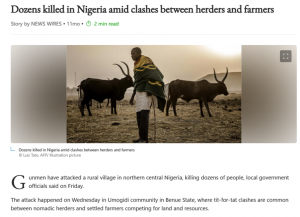
Agriculture as food production integrated with food processing and distribution, and further with chemistry, military, machinery, seeds, and finally pharmaceuticals and digital (smart). Whether to be concerned or optimistic about this trend is a personal decision, but a thorough investigation based on caution is fully warranted. I personally believe that this trend will further reduce the number of self-reliant, natural, self-sufficient, local, family, small farms, further alienate farmers from agriculture, and accelerate the “dehumanization of agriculture.” Seeing that in Africa, farmers have already been reduced to a state where it is impossible to farm without purchasing seeds that cost $90 a can, and also seeing that in Nicaragua there are no alternative seeds other than genetically modified corn, the alienation and poverty of farmers seem to only aggravate. I came back after seeing how desperate the situation was, but in fact, the same process is taking place in Korea as well. It is one world system anyway.
What should we do? It is unfortunate that people's response to this seems to be out of focus, sometimes giving up or at times misunderstanding or ignoring reality.
Alternative farming technologies must be created and distributed. This technology is not created by the government, universities, or companies. Technology that is beneficial to the people can only be created by the people. It is encouraging that various alternative farming methods such as organic farming, natural farming, permaculture, biodynamics, and carbon farming have emerged. However, my focus is on the perspective of 'how independent and free people can be', or more explicitly, 'liberation from money'. This is Farming for Freedom.
Rei pits alone improve soil moisture and nutrients at no cost. It is excellent for dry areas. I can't tell you how much this method has been praised everywhere I went. Even if each farm installs one vertical Rei pond, they will have farming water in the dry season. Even if the common rocket stoves are properly distributed, the use of firewood will be reduced by 1/3 and the corresponding forests will be saved. By breeding earthworms and maggots and converting animal and human feces into feed and fertilizer, the added value can be several times higher. If you reach the level of no-till and no-weeding, you will be able to make barren land fertile. All of these techniques are not difficult and cost almost nothing. We need something like this. Freedom from money. Freedom from establishment.
In Africa, all residues were being burned in soil that was already lacking in organic matter. I realized that slash-and-burn is still the universal farming method for mankind. In Korea, heavy equipment is used to plow fields every planting season. This type of weeding and tillage is a major cause of soil organic matter reduction and soil degradation.
We mistakenly believe that mother earth will give us generously, but the more we abuse it, the more deterioration, or death, of the soil will inevitably occur. In Africa, people immediately receive punishment for abusing the soil, but in Korea, they fix the problem by ‘buying with money’, so they are insensitive to how serious the problem is and how it progresses. Tillage causes soil degradation, but the problem is covered up by purchasing and spreading compost. Once the soil is hardened, it is further tilled with a machine. This means that Africa does not have the money to use fertilizers and machinery, so they receive punishment immediately, while Korea solves the problem with money, which in fact is only delaying and growing the problem.
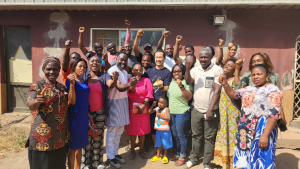 Let's not think that agricultural technology is the domain of governments, universities, companies, experts, scientists, and scholars. Rather, as a result of handing over technological leadership to them, farmers around the world are unable to avoid poverty. People like us cannot create smart farms or plantations with our own technology, or research, develop, and produce herbicides, pesticides, and antibiotics. But that's not the only technology. There are many technologies with which we can create research experiments. Rather, only technology created by the people can help the people. Let’s create and share such technologies more actively.
Let's not think that agricultural technology is the domain of governments, universities, companies, experts, scientists, and scholars. Rather, as a result of handing over technological leadership to them, farmers around the world are unable to avoid poverty. People like us cannot create smart farms or plantations with our own technology, or research, develop, and produce herbicides, pesticides, and antibiotics. But that's not the only technology. There are many technologies with which we can create research experiments. Rather, only technology created by the people can help the people. Let’s create and share such technologies more actively.
There are so many things you can do through farming. Poverty eradication, farmer’s sovereignty, peace, environmental restoration, community unity, and desert greening. But perhaps the most important thing is to protect the independence and freedom of the people.


